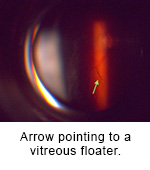Vitreous Floaters
Vitreous floaters are small moving spots that appear in your field of vision. They may be especially noticeable when you look at something bright, such as white paper or a blue sky. While annoying, floaters don't interfere with your sight in most cases.
 Occasionally a particularly large floater may cast a subtle shadow over your vision. This tends to occur only in certain types of light. Most of the time people learn to live with floaters and ignore them as they often improve over months to years. Only rarely do benign floaters become bothersome enough to consider treatment. Occasionally a particularly large floater may cast a subtle shadow over your vision. This tends to occur only in certain types of light. Most of the time people learn to live with floaters and ignore them as they often improve over months to years. Only rarely do benign floaters become bothersome enough to consider treatment.
Sometimes floaters are a sign of a more serious condition. You should seek immediate medical attention if you notice a sudden increase in the number of floaters.
Immediate medical attention is especially important if the floaters are accompanied by brief flashes of light or a loss of side vision. If you have these symptoms, see your ophthalmologist right away. These symptoms may be caused by:
 Retinal detachment Retinal detachment
- Retinal tear
- Bleeding within the eye
Retinal detachments, tears and holes require immediate treatment to prevent permanent loss of vision.
Symptoms of Vitreous Floaters
Floaters move as the eyes move. They generally appear to dart away when you try to focus on them.
Eye floaters can appear in many different shapes, such as:
- Black or gray dots
- Squiggly lines
- Threadlike strands, which can be knobby and semi-transparent
- Cobwebs
- Ring shaped
When viewed by your doctor with the microscope, they sometimes have an appearance of a “lava” lamp as the floaters can move up down by heat convection as well as eye movement.
Once you develop eye floaters they usually do not go away, though they tend to improve over time.
Causes of Vitreous Floaters
Most floaters are caused by small flecks of a protein called collagen.
The back compartment of the eye is filled with a clear gel-like substance called vitreous humor.
As you age, the vitreous and its millions of fine collagen fibers shrink and become shred-like. These shreds can accumulate in the vitreous and can cause a change in the amount of light that hits the retina – the light-sensitive tissue in the back of the eye. This change causes the symptoms of floaters.
These changes can happen at any age though they most often occur between ages 50 and 75. People who are very nearsighted or have had cataract surgery are especially susceptible.
Rarely, vitreous floaters can result from other eye surgery or:
- Eye disease
- Eye injury
- Diabetic retinopathy
- Crystal-like deposits that form in the vitreous
Serious eye disorders associated with floaters include:
- Retinal detachment
- Retinal tear
- Vitreous hemorrhage (bleeding)
- Vitreous and retinal inflammation caused by viral infections, fungal infections, or auto-immune inflammation
- Eye tumors
When to Seek Medical Attention for Vitreous Floaters
If you only have a few floaters that don't change over time, it usually does not indicate a serious eye problem.
It's important to see a doctor if:
- Floaters seem to worsen over time, especially if the changes are sudden in onset.
- You experience flashes of light or any vision loss accompanied by floaters.
- You develop floaters after eye surgery or eye trauma.
- You have eye pain along with floaters.
Treatment of Floaters
Benign floaters almost never require medical treatment.
If they are bothersome, you can move them away from your field of vision by moving your eyes. This maneuver shifts the fluid in your eyes. Looking up and down is usually more effective than looking from side to side. Using a darker background on the computer with a lighter font sometimes is useful.
If floaters are so dense and numerous that they affect your vision, your eye doctor may consider a surgical procedure called a vitrectomy. During this procedure, the vitreous and its floating debris are removed and replaced with a salt solution.
Vitrectomy may have complications, such as:
- Retinal detachment
- Retinal tears
- Cataracts
Most surgeons will not perform vitrectomy unless floaters are seriously affecting the patient's vision, a very rare eventuality.
BACK
|


